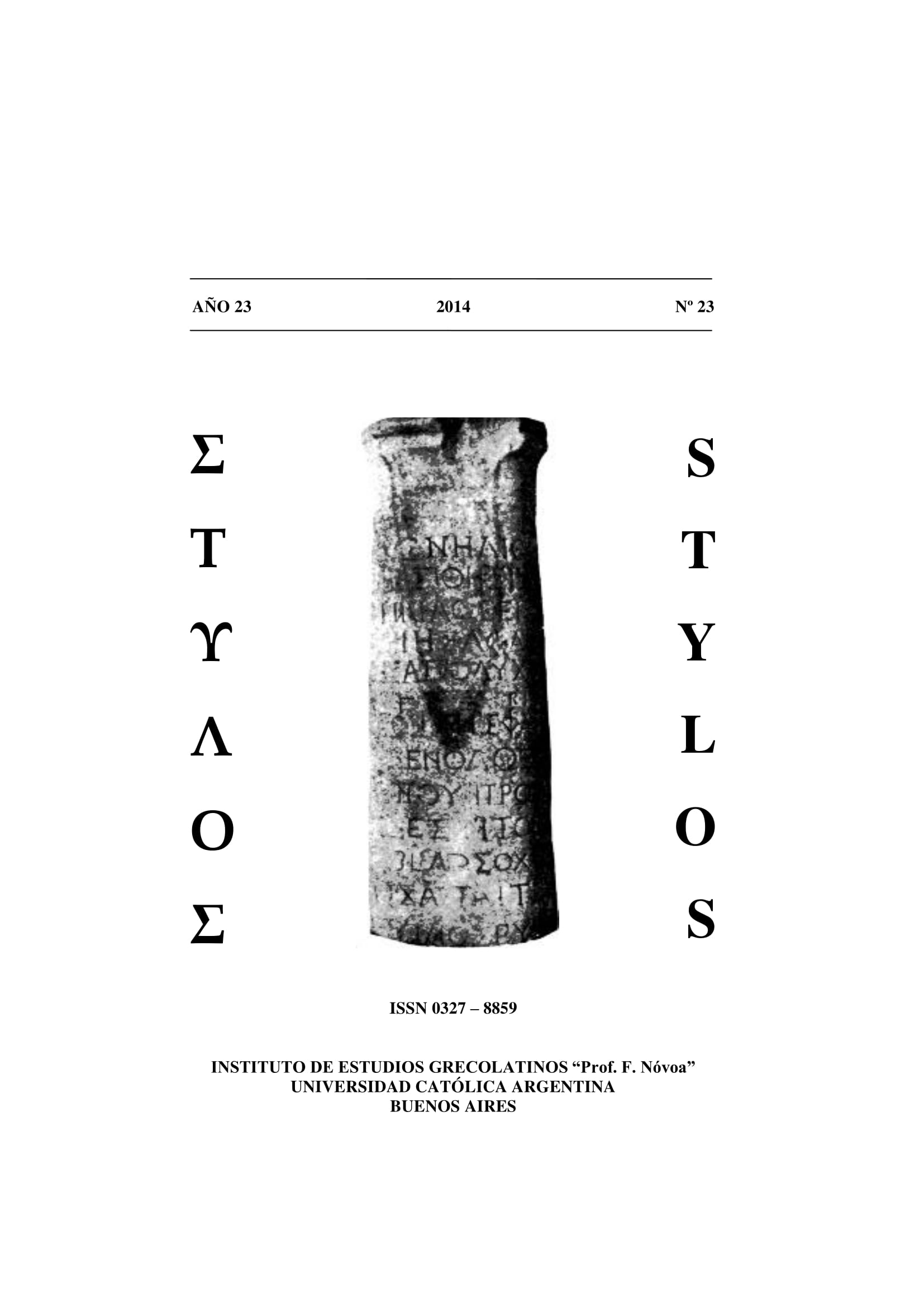DE MADRES, CIUDADES Y TABLILLAS: ALCANCES POLÍTICOS Y LITERARIOS DE UN ENIGMA FAMILIAR EN LA COMEDIA MEDIA (ANTÍFANES, SAFO, FR. 194 K.-A)
Keywords:
Antiphanes – Sappho – MiddleComedy – Athenianfamily - PoliticsAbstract
The fragment 194 (Kassel-Austin) of the comic poet Antiphanes, from his play Sappho (c. 360 BCE), reproduces a dialogue between the poetess and an unknown character related to a riddle. The suggested image of a woman keeping his silent children safe while they cry loud to those who want to listen is re-signified in the passage from both a political and a self-referential level. Initially understood to be a pólis protecting her corrupt demagogues, the family scene is finally explained in terms of a writing tablet with letters seen as its mute children. The riddle, therefore, becomes an interesting strategy in order to consolidate, from a comic standpoint, the polyvalence of the maternal image as aefficient metaphorical mechanism capable of addressing those issues which are the main topics of the genre.
Downloads
References
BIBLIOGRAFÍA
EDICIONES CRÍTICAS
AUSTIN, C. & D. OLSON (2004) (edd.) Aristophanes Thesmophoriazusae, Oxford.
DOVER, K. J. (1968) (ed.) Aristophanes Clouds, edited with introduction and commentary by K. J. Dover], Oxford.
EDMONDS, J. M. (1959) (ed.) The Fragments of Attic Comedy, Vol. II: "Middle Comedy", Leiden.
GULICK, C. B. (1927) (ed.) Athenaeus. The Deipnosophists, with an English Translation by Charles Burton Gulick, Cambridge (MA) & London.
KASSEL, R. & C. AUSTIN (1991) (edd.) Poetae Comici Graeci, Vol. II: "Agathenor – Aristonymus", Berlin & New York.
OLSON, S. D. (2007) (ed.) Broken Laughter. Select Fragments of Greek Comedy, Oxford.
RHODES, P. J. (1994) (ed.) Thucydides. History III, edited with translation and notes by P. J. Rhodes, Warminster.
RHYS ROBERTS, W. (1902) (ed.) Demetrius On style, Cambridge.
SANCHIS LLOPIS, J., R. MONTAÑÉS GÓMEZ & J. PÉREZ ASENSIO (2007) Fragmentos de la Comedia Media (Biblioteca Clásica Gredos, 361), Madrid.
SOMMERSTEIN, A. H. (1981) (ed.) The Comedies of Aristophanes, vol. 2. Knights, edited with translation and notes by Alan H. Sommerstein, Warminster.
SOMMERSTEIN, A. H. (1994) (ed.) The Comedies of Aristophanes, vol. 8. Thesmophoriazusae. Edited with translation and notes by Alan H. Sommerstein.
SOMMERSTEIN, A.H. (1991) (ed.) The Comedies of Aristophanes, vol. 3. Clouds, edited with translation and notes by Alan H. Sommerstein, Warminster, 1982.
VOIGT, E.-M. (1971) (ed.) Sappho et Alcaeus. Fragmenta, Amsterdam.
BIBLIOGRAFÍA SECUNDARIA
AMOROUX, I. (1995) Antiphane et les thèmes de la comédie moyenne, Montpellier.
ARNOTT, W. G. (2010) "Middle Comedy", en DOBROV, G. W. (ed.) Brill's Companion to the Study of Greek Comedy, Leiden & Boston; 279-331.
BERS, V. (2009) Genos Dikanikon. Amateur and Professional Speech in the Courtrooms of Classical Athens (Hellenic Studies, 33), Washington DC.
BUIS, E. J. (2011a) “(En)acting Law on Stage: Time, Comic Rhetoric and Legislative Language in Aristophanes’ Acharnians (vv. 676-718)”, Revue Internationale des Droits de l'Antiquité, 3º série, Nº 58; 13-38.
BUIS, E. J. (2011b) “Los partos monstruosos de Doco: maternidad, usura y demagogia en los testimonios cómicos de Aristófanes y sus rivales”, en DOMÍNGUEZ, N., E. CABALLERO DE DEL SASTRE, A. L. MARTÍN, J. PALACIOS, E. RODRÍGUEZ CIDRE & M. SUÁREZ (comp.) Miradas y saberes de lo monstruoso, Buenos Aires: Editorial de la Facultad de Filosofía y Letras (UBA); 125-148.
BUIS, E. J. (2012a) “Enemigos íntimos: el imaginario simbólico del matrimonio y las metáforas eróticas de la política internacional en la comedia antigua”, en RODRÍGUEZ CIDRE, E., E. J. BUIS & A. ATIENZA (eds.) El oîkos violentado: genealogías conflictivas y perversiones del parentesco en la literatura griega antigua, Buenos Aires; 191-228.
BUIS, E. J. (2012b) "El comediógrafo ebrio y sus deberes maritales: Cratino y el imaginario jurídico del divorcio en la trama de Pytine (Σ Ar. Eq. 400a)”, Stylos 21; 7-24.
CECCARELLI, P. (2004) "Écriture féminine, écriture épistolaire, parole des rhétheurs: à propos du fr. 194 K.-A. de la Sappho d'Antiphane", en NADJO, L. & E. GAVOILLE (eds.) Epistulae antiquae, Vol. II, Louvain; 11-32.
CECCARELLI, P. (2013) Ancient Greek Letter Writing: A Cultural History (600 BC-150 BC), Oxford.
CLEMENTS, A. (2014) Aristophanes' Thesmophoriazusae. Philosophizing Theatre and the Politics of Perception in Late Fifth-Century Athens, Cambridge.
CLINTON, H. F. (1832) "The Comic Poet Antiphanes", Philological Museum 1; 558-608.
DOBROV, G. W. (2002) "Μάγειρος ποιητής: Language and Character in Antiphanes", en WILLI, A. (ed.) The Language of Greek Comedy, Oxford; 169-190.
GAVRILOV, A. K. (1997) "Techniques of Reading in Classical Antiquity", CQ 47; 56-73.
GLOWACKI, K. (2003) "A Personification of Demos on a New Attic Document Relief", Hesperia 72 (4); 447-466.
GOLDHILL, S. (2000) “Placing Theatre in the History of Vision”, en RUTTER, K. N. & B. A. SPARKES (eds.) Word and Image in Ancient Greece, Edinburgh; 161–179.
HALL, E. (2000) "Female figures and metapoetry in Old Comedy", en HARVEY, D. & J. WILKINS (eds.) The Rivals of Aristophanes, Exeter; 407-418.
HALL, E. (2006) “Female Personifications of Poetry in Old Comedy”, en The Theatrical Cast of Athens. Interactions between Ancient Greek Drama and Society, Oxford; 170-183.
HANSEN, M. H. (1974) The Sovereignty of the People's Court in Athens in the Fourth Century BC and the Public Action Against Unconstitutional Proposals, Odense.
HENDERSON, J. (2014) "Comedy in the Fourth Century II: Politics and Domesticity", en FONTAINE, M. & A. C. SCAFURO (eds.) The Oxford Handbook of Greek and Roman Comedy, Oxford; 181-198.
HUNTER, V. (1986) “Thucydides, Gorgias, and Mass Psychology”, Hermes 114: 412–429.
JOHNSTONE, S. (1999) Disputes and Democracy. The Consequences of Litigation in Ancient Athens, Austin.
KEULS, E. (1985) The Reign of the Phallus. Sexual Politics in Ancient Athens, New York.
KIDD, S. E. (2014) Nonsense and Meaning in Ancient Greek Comedy, Cambridge.
KNOX, B. M. W. (1968) "Silent Reading in Antiquity", GRBS 9; 421-435.
KONSTAN, D. (2000) "Pity and the Law in Greek Theory and Practice", Dike 3; 125-145.
KONSTANTAKOS, I. (2000) "Notes on the chronology and career of Antiphanes", Eikasmos 11; 173-198.
LEVER, K. (1953) "Poetic Metaphor and Dramatic Allegory in Aristophanes", The Classical Weekly 46 (15); 220-223.
LEVER, K. (1954) "Middle Comedy, Neither Old nor New but Contemporary", CJ 49 (4); 167-180.
LUZ, Ch. (2013) " What has it got in its pocketses? Or, what makes a riddle a riddle?", en KWAPISZ, J., D. PETRAIN & M. SZYMAŃSKI (eds.), The Muse at Play: Riddles and Wordplay in Greek and Latin Poetry. (Beiträge zur Altertumskunde, 305), Berlin & Boston; 83-99.
MARTIN, R. P. (2001) "Just like a woman: Enigmas of the lyric voice", en LARDINOIS, A. & L. MCCLURE (eds.), Making Silence Speak. Women's Voices in Greek Literature and Society, Princeton; 55-74.
MEINEKE, A. (1839) Historia critica comicorum graecorum, Berolini.
NESSELRATH, H.-G. (1990) Die attische Mittlere Komödie. Ihre Stellung in der antiken Literaturkritik und Literaturgeschichte, Berlin & New York.
NESSELRATH, H.-G. (1996) "Antiphanes", en Der Neue Pauly I, Stuttgart, 781-782.
NESSELRATH, H.-G. (2014) "Later Greek Comedy un Later Antiquity", en FONTAINE, M. & A. C. SCAFURO (edd.) The Oxford Handbook of Greek and Roman Comedy, Oxford; 667-679.
POLLITT, J. J. (1987) “Pots, Politics, and Personifications in Early Classical Athens,” Yale University Art Gallery Bulletin 40; 9-15.
PUCCI, P. (1996) Enigma segreto oracolo, Pisa & Roma.
RHODES, P. J. (1993) A Commentary on the Aristotelian Athenaion Politeia, Oxford.
ROSENMEYER, P. A. (2001) Ancient Epistolary Fictions. The Letter in Greek Literature, Cambridge.
SAETTA-COTTONE, R. (2005) Aristofane e la poetica dell'ingiuria. Per una introduzione alla loidoria comica, Roma.
SANCHIS LLOPIS, J. (1990) "Acertijos y adivinanzas en la Comedia griega", en SANCHIS, J. & I. ROCA (edd.) Homenatge a José Esteve Forriol, Valencia; 151-161.
SHAPIRO, H. A. (1993) Personifications in Greek Art. Representation of Abstract Concepts. 600-400 B.C., Zurich.
SMITH, A. C. (2003) “Athenian Political Art from the Fifth and Fourth Centuries BCE: Images of Political Personifications”, en BLACKWELL, C. (ed.) Dēmos: Classical Athenian Democracy (MAHONEY, A. M. & R. SCAIFE [edd.], The Stoa: A consortium for electronic publication in the humanities [disponible en www.stoa.org].
SMITH, A. C. (2011) Polis and Personification in Classical Athenian Art, Leiden & Boston.
SPANGENBERG, P. (2012) "Entre la poesía y la política: la retórica según Gorgias", en LIVOV, G. & P. SPANGENBERG (eds.) La palabra y la ciudad. Retórica y política en la Grecia antigua, Buenos Aires; 157-178.
SVENBRO, J. (1993) Phrasikleia: An Anthropology of Reading in Ancient Greece, Ithaca.
TODD, S.C. (1993) The Shape of Athenian Law, Oxford.
TRAILL, A. (2005) "Acroteleutium's Sapphic Infatuation (Miles 1216-83)", CQ 55 (2); 518-533.
WOHL, V. (2002) Love Among the Ruins. The Erotics of Democracy in Classical Athens, Princeton & Oxford.
YATROMANOLAKIS, D. (2007) Sappho in the Making: An Anthropology of Reception (Hellenic Studies, 28), Washington DC.
Downloads
Published
How to Cite
Issue
Section
License






